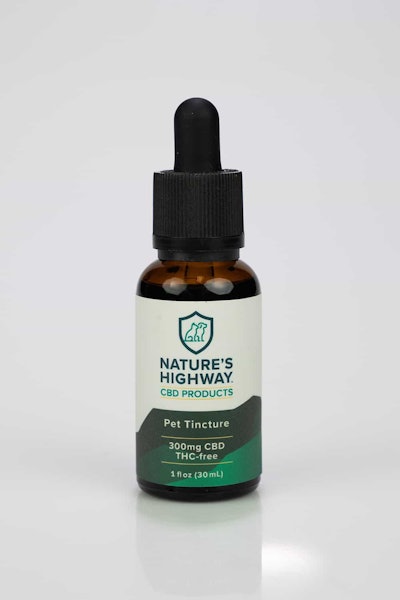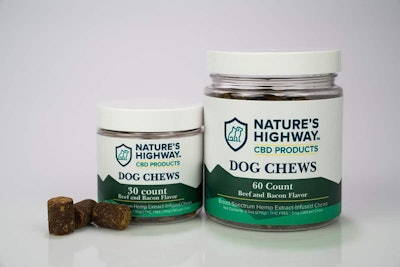
Giving your pup CBD might calm his nerves around anxiety-inducing events such as thunder or fireworks, per anecdotes. But, if you grow hemp, pet CBD could also mean business.
In the U.S., the market grew by a factor of 10 between 2018 and 2019, according to the Brightfield Group. And Nielsen and Headset predict that “hemp-based CBD pet products will represent 3-5% of all hemp CBD sales within the U.S. by 2025.”
East Coast-based cannabinoid hemp grower and processor Nature’s Highway is capitalizing on the opportunity.
“We have seen a growing interest in the sector,” said Dan Sturdevant, managing director of Nature’s Highway. “It’s actually something that we’ve added to our sample line. In other words, we’ve begun packaging individual pet treats as sample sized because we get a lot of questions about them, and we’ve seen a really strong response from folks who get a sample turning around to order them.”
Sturdevant noted that pet owners and others have said anecdotally that there are potential benefits of giving CBD to pets. Among them, the belief that if a dog takes a CBD pet treat, the treat might curb its anxiety and help it avoid ripping up furniture when its owner leaves the house.
But, Sturdevant said customers are also interested in administering CBD to their pets "to prevent seizures and other neurological concerns associated with that. It’s a similar process to the introduction [to animals] as it was for humans.”

Indicating the mounting interest in pet CBD, in 2018, the Veterinary Information Network conducted a survey of veterinarians. Sixty-three percent of respondents said their clients asked them on at least a monthly basis about giving cannabis products to their pets.
RELATED: New Michigan Law Allows Veterinarians to Discuss Marijuana and CBD With Pet Owners
There’s a growing body of research addressing giving CBD to dogs. A Colorado State University (CSU) study conducted on dogs with epilepsy found that 89% of dogs that received CBD had fewer seizures. And a study performed by researchers from Cornell University, CSU and the Metzger Animal Hospital in State College, Pa., “suggests that 2 mg/kg of CBD twice daily can help increase comfort and activity in dogs with OA [osteoarthritis].”
As for humans’ feline friends, researchers from Israel and The Netherlands reviewed dozens of studies on Alzheimer’s disease in humans and feline cognitive dysfunction in cats for a paper published in the Journal of Cannabis Research.
“Cannabidiol (CBD) is a promising agent that may improve the life of these patients, as it was shown to potentially treat several of the pathologies found in both conditions,” that paper’s abstract states. “[Y]et there is a need for further research in order to establish the benefits and safety of CBD to both human and feline patients.”
Nature’s Highway was founded in 2017, and the following year, began selling cannabinoid products for human consumption—tinctures, topicals, gummies and vaporizer cartridges with CBD and Delta-8 THC. The company entered the pet CBD category about a year ago.
In a press release for some new Nature’s Highway pet products, customer Melanie Ropp was quoted as stating that she gives the business’s Pet Tincture to her 11-year-old Labrador retriever for “anxiety and itchy skin."
Nature’s Highway grew about 40 acres of hemp at its Neeses, S.C., farm, in 2020 and plans to grow roughly 75 to 80 acres of hemp in 2021.
In a greenhouse that Sturdevant estimates is roughly 3,000 to 4,000 square feet, the company takes clones from its mother plants—of which it plans to have about 100 this year—and starts growing them. They then plant the clones in the field by hand.
Nature’s Highway runs a 3,000-square-foot extraction facility, also in Neeses, that can process hundreds of pounds of biomass in a day, Sturdevant said. There, the company extracts all of its CBD crude oil using a rotary evaporator and supercooled ethanol extraction.

Nature’s Highway works with a compound pharmacist to formulate all finished goods, including its pet treats: chicken-flavored tinctures, beef liver- and bacon-flavored chews, and CBD-infused catnip.
The company brings in its catnip from an outside supplier. It then shreds, dries and extracts it, and infuses it with CBD isolate.
“One of the reasons we have come out with a catnip is that we’d had a number of stores and even individual customers reach out and say, ‘Hey! My dog really benefits from the tincture,’ or ‘I can get my dog to take the tincture all day. He loves the flavor. But my cat refuses,’” Sturdevant said. “And obviously, they’re not going to eat a beef-and-bacon treat most of the time because cats are fickle and harder to dose. So, the catnip was a creative solution to that problem.”
It’s important to ensure pet CBD products are safe, Sturdevant said, offering a few words of advice for other operators looking to enter the pet CBD market: “I would definitely make sure that you are partnered with someone who understands flavors and formulations so that you are getting a stable and consistent product, because it’s not just as simple as taking some distillate and mixing it up into the batter of some dog treats and then baking them.
“You want to make sure that you have uniformity, you obviously need to have a certificate of analysis on all of the products that you are putting out there, and you want to make sure that you are creating a flavor profile that animals are actually going to enjoy.”
Nature’s Highway offers pet CBD serving sizes based on weight and also severity of the condition.
Sturdevant added: “If you have a small cat versus a Maine Coon cat, for example, you’re going to give them different amounts."
























